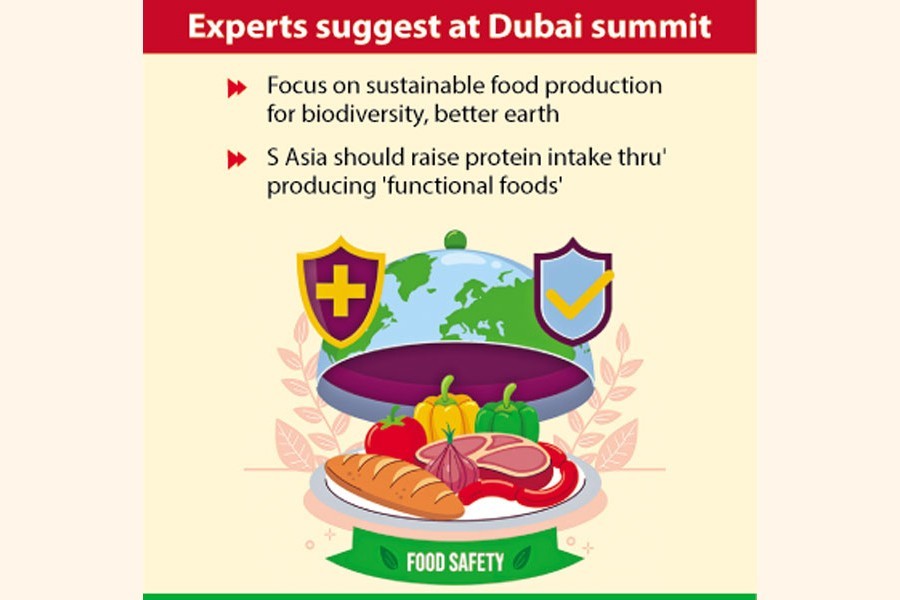Speakers at a summit in Dubai on Tuesday stressed the need for boosting protein intake to ensure food security and achieve the SDGs in the countries like Bangladesh.
They also focused on maintaining sustainable food production approaches for ensuring biodiversity and a better earth.
Global food and agriculture experts, researchers, businessmen, academicians, and market leaders said these while speaking at the "Sustainasummit" in the UAE on Tuesday.
The US Soybean Export Council (USSEC) organised the day-long summit at a hotel in Dubai.
Kevin Roepke, Regional Director - South Asia and Sub-Saharan Africa of USSEC, Juhi Gupta, Director - Sustainability of Tetra Pak, India, Lucas Blaustein, Regional Agriculture Attaché at USDA, Dennis Fujan, a soyabean farmer of USA, Deeba Giannoulis, Head of US Soy Marketing of USSEC, Khandkar Morshed Millat, Chief Advisor of Sustainable Finance - Green Tech Foundation of Bangladesh, and George Chamberlain spoke at the summit, among others.
Mr Kevin said the countries like Bangladesh should enhance their protein intake for achieving the SDGs.
"Bangladesh's per capita protein intake is still very low. The country should boost the intake through a sustainable way for building a better nation."
He told the FE that the USSEC exports soyabean to Bangladesh and other countries. It is a major source of protein and produced in a sustainable manner in the US.
US exported 71.79 million tonnes of soyabean across the globe in 2022, of which it shipped 1.0 million tonnes to Bangladesh.
Professor Eresha Mendis of Sri Lanka said the South Asian countries should increase their protein intake through producing more 'functional foods'.
Functional foods are highly nutritious and associated with a number of powerful health benefits, as these can protect people against diseases, prevent nutrient deficiencies, and promote proper growth and development.
Ms Juhi Gupta said, "If sustainable production method is not maintained in global food and protein productions, we will fail to achieve the SDGs by 2030."
Ms Namrata Rana, Director of Futurescape in India, said green production system should be applied in food production across the globe for supplying adequate protein.
Mr Millat said Bangladesh has emphasised green financing relating to industrial production for ensuring food security. The central bank has taken different steps, including supporting projects for green manufactures to encourage safe food production.
Other speakers also focused on increasing soya intake in addition to animal protein to offset protein intake deficit in different countries like Bangladesh.
Bangladesh's poultry, fisheries and livestock sectors use soya-cake and other soyabean products for producing feeds.
The country imports about 2.8 million tonnes of soyabean from Brazil, Argentina, USA and other countries for meeting its local demand. Of these countries, the share of USA is 37 per cent, said Habibur Rahman Kanchan, Team Leader of USSEC in Bangladesh.
According to statistics, Bangladesh's per capita protein consumption has increased over the years, but it is still below the international standard.
The Bangladesh Bureau of Statistics (BBS), in its Household Income and Expenditure Survey (HIES) 2016 report, said daily per capita consumption of major meat like chicken, duck and beef as well as fish and egg has increased compared to that in 2010.
Daily egg consumption by a person increased to 13.58 gram in 2016, from 7.20 gm in 2010. Chicken and duck consumption increased to 17.33 gm per day in 2016, compared to 11.22 gm in 2010.
Per capita egg consumption in Bangladesh is 104 pieces, while it is 337 in Japan, and 368 in Mexico. Bangladesh's per capita meat consumption is 4.04 kg annually, while it is 49.33 kg in Japan, and 64.88 kg in Mexico.


